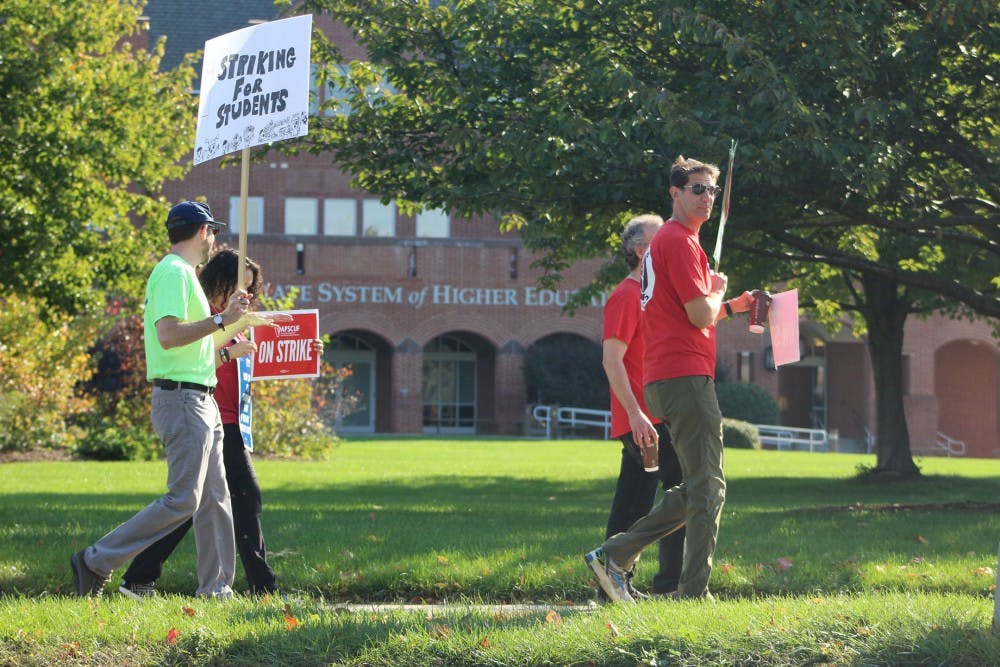Pennsylvania’s State System of Higher Education (PASSHE) endured the first faculty strike in its 33-year history, highlighting the system’s deep-rooted financial challenges throughout October’s job action.
Despite the Association of Pennsylvania State College and University Faculties (APSCUF) ratifying the tentative contract that effectively ended the strike, faculty and administrators continue to advocate for change. Instead of picket lines and press releases, they are focusing on budget proposals and round tables to increase funding for higher education.
State funding
PASSHE receives about the same amount of funding from the legislature today as it did in 1997, said Marshall, PASSHE’s media relations manager. The appropriation levels do not account for inflation, decreased enrollment rates and the rising cost of utilities, healthcare coverage and pensions.
With only two main sources of revenue — tuition and state appropriations — students are directly affected by how much money PASSHE gets from the state, Marshall said.
“We’ve seen declining support from the state government, in terms of appropriations, over the last 30 plus years,” said Kara Laskowski, Shippensburg University’s APSCUF chapter president.
The Great Recession played a role in decreased state funding, said Marshall. Pennsylvania allocated about $484 million to PASSHE for the 2007–2008 academic year, but dropped funding to about $413 million over the following four years.
“Virtually every state saw reductions,” Marshall said, referring to the impact of the recession on funding for higher education. “Our economy is recovering slower than other states.”
Marshall said despite increased funding in recent years, PASSHE remains $60 million short of its pre-recession levels. The Board of Governors unanimously voted to request $505.2 million for its 2017–2018 budget in early October — an increase of $61 million.
“We believe the $61 million increase being requested is a realistic number,” Chancellor Frank Brogan said, when the Board of Governors approved the request in October. “The state system continues to face unprecedented fiscal challenges.”
While PASSHE still has its challenges, it might not get the requested budget.
“This current fiscal year is not looking good,” Marshall said, explaining Pennsylvania’s revenue is down by more than $250 million than expected for the year.
Tuition hikes
Tuition prices climbed more than $2,000 in the last decade, according to PASSHE’s website. Students paid $5,038 for a semester at a PASSHE university in the 2006–2007 school year. Last year students dished out $7,060 for a semester, despite increased funding from the state.
Since PASSHE’s inception in 1983, students continually paid more for their education as the state reduced its funding.
“For every dollar [a] university spent,”Laskowski said, “80 cents came from state appropriations and 20 cents came from student-funded tuition and fees.”
Laskowski said the numbers are switched today, placing the financial burden on students.
Despite increasing tuition rates, PASSHE students receive about $2,500 less than the average student nationwide, according to PASSHE’s website. In the 2013–2014 academic year the national average of money spent on a full-time student was $6,552 while the PASSHE average was $3,902.
The national average has been decreasing in greater rates than PASSHE’s average over the past 10 years. Marshall said the chancellor’s office works to maximize the system’s efficiency to keep tuition rates low.
PASSHE and university cuts
PASSHE sought cuts in employee healthcare coverage during the last round of union contract negotiations as one way of keeping tuition rates low and to close the deficit.
Marshall said the chancellor’s office reduced its staff to save money, including cutting three of the five vice chancellor positions since Brogan took office.
“We have a very small staff,” Marshall said, comparing it to other state systems. The chancellor’s office includes about 50 employees who serve in communications, human resources, academic affairs, finance, public affairs and maintenance.
The administration can legally only be funded with up to 0.5 percent of appropriations, tuition and fees. The chancellor’s office is located at the Dixon University Center in Harrisburg, and is used for academic purposes. Of the five buildings one is used for administrative purposes, and there is no cafeteria.
While universities collect tuition and fees independently, state appropriations are divided up based on a formula, which is also mandated by law, Marshall said. When revenue from tuition and fees and state funding is not enough to cover university budgets each administration makes cuts.
Shippensburg University has been facing annual deficits ranging from $1 million to $6 million every year for more than a decade. Increasing tuition is not enough to offset the deficit and cuts were made across SU, said Laura Ludlam, SU’s director of communications and marketing.
There are more than 140 employee vacancies at SU, including administrative, staff and faculty positions. Ludlam said university departments are not dismissing employees, but rather they are not filling positions once employees retire or leave.
Marshall and Ludlam said there is not a lot left to cut from budgets. Administrators are reducing grounds and maintenance services, refraining from equipment purchases and SU switched to natural gas as a more economical heating and cooling source.
SU is bolstering its efforts to enroll new students as a way of generating revenue, Ludlam said. High school graduation rates are decreasing in Pennsylvania, which affects the number of people who go to college.
SU anticipated a declining enrollment when it formulated its per-credit tuition model, which began this fall. Its $1.3 million deficit was also taken into consideration during budget planning meetings, Ludlam said. Between budget cuts and revenue from tuition, SU only has to look toward the next fiscal year.




The Slate welcomes thoughtful discussion on all of our stories, but please keep comments civil and on-topic. Read our full guidelines here.